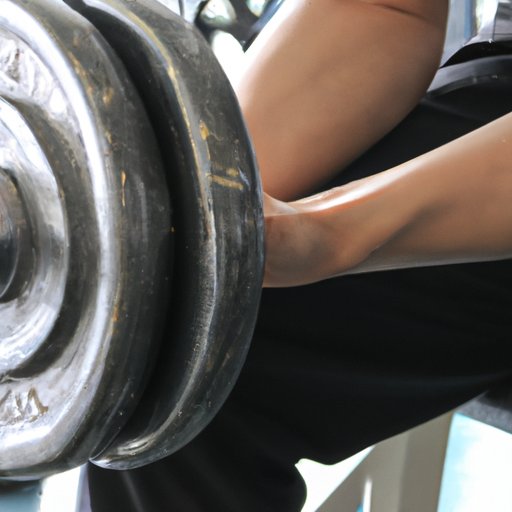
I. Introduction
Weightlifting is often associated with gaining weight, but is there any truth to that? In this article, we’ll explore the relationship between weightlifting and weight gain, and dispel some common myths along the way.
II. Busting myths: How lifting weights can actually help you lose weight
First, let’s address some common misconceptions about weightlifting. One of the most persistent is the idea that lifting weights makes you bulky or heavy. In reality, weightlifting can actually help you lose weight, as long as you do it properly.
Research has shown that strength training is an effective way to burn fat and increase lean muscle mass. When you lift weights, you burn calories, and the more muscle you have, the more calories you burn even when you’re not working out.
III. The science behind muscle gain: How lifting weights affects your weight
It’s important to understand that muscle weighs more than fat. This means that, over time, lifting weights can actually lead to weight gain, but in a good way. As you build muscle, you’ll likely see changes in your body composition, even if your overall weight stays the same or even goes up slightly.
IV. Weight gain vs. muscle gain: Understanding the difference when lifting weights
It can be difficult to distinguish between gaining weight and gaining muscle when you’re lifting weights. This is why it’s important to use multiple measures of progress, such as measuring body fat percentage or tracking inches lost, in addition to tracking your weight on the scale.
If you’re trying to lose weight, it’s important to keep in mind that losing fat and gaining muscle are not mutually exclusive. In fact, lifting weights can help you maximize fat loss while still building lean muscle mass.
V. Maximizing weight loss through strength training: Debunking common misconceptions
There are also some common misconceptions about lifting weights for weight loss. For example, some people believe that cardio is the only way to burn fat, but research has shown that strength training can be just as effective at burning calories and increasing metabolism.
Incorporating strength training into your weight loss routine can help you maintain muscle mass while you lose fat, which is key for sustainable weight loss.
VI. Why scale weight isn’t the only measure of progress when lifting weights
Relying solely on the scale to measure progress can be misleading when you’re lifting weights. For example, if you’re building muscle and losing fat at the same time, you may not see a change in your overall weight even though you’re making progress.
Instead of relying solely on the scale, consider other measures of progress, such as body fat percentage, measurements, or strength gains.

VII. Incorporating weightlifting into your weight loss journey: Tips and tricks
If you’re new to weightlifting, it can be overwhelming to know where to start. The key is to start small and be consistent.
When designing a strength training program, it’s important to focus on compound exercises (like squats, deadlifts, and bench presses) that work multiple muscle groups at once. Aim for 2-3 strength training sessions per week, and make sure to give your muscles time to rest and recover between sessions.
VIII. Building lean muscle mass with weightlifting: The key to sustainable weight loss
Building lean muscle mass through weightlifting is a sustainable way to lose weight and keep it off. In addition to increasing metabolism and burning fat, having more muscle can also improve your overall health and wellness.
To maximize your muscle gains, focus on progressive overload (gradually increasing the weight you lift over time) and vary the exercises you do to challenge your muscles in different ways.
IX. Conclusion
Lifting weights can be an effective way to lose weight and improve your overall health and wellness, as long as you approach it with the right mindset and knowledge. Keep in mind that the scale is just one measure of progress, and make sure to incorporate other measures like body fat percentage and strength gains.
If you’re new to weightlifting, don’t be afraid to ask for help from a personal trainer or other fitness professional. With consistent effort and the right approach, you can reach your weight loss and fitness goals.




